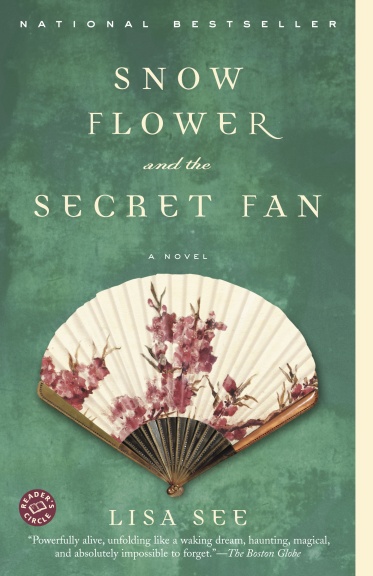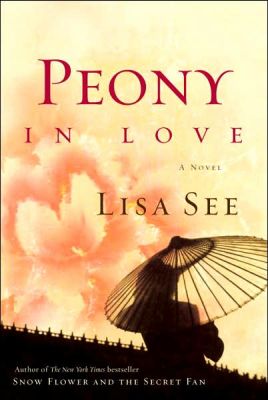To Endure, and to be Heard
Bestselling Author Lisa See on the Deepest Human Desires

Now in its 22nd year, the CALM Celebrity Authors’ Luncheon has become something of a Santa Barbara institution – a respected literary event as well as a popular annual fundraiser for the nearly forty-year-old non-profit organization. CALM, whose acronymic name stands for Child Abuse Listening and Mediation, was founded in 1970 for the purpose of preventing, assessing, and treating child abuse and family violence. Writing about such topics is not a prerequisite for participating authors, but co-chairs Sharon Bifano and Stephanie Ortale were aware of the potential connection when they invited bestselling novelist Lisa See to this year’s event.
See is the author of Snow Flower and the Secret Fan, which chronicles the lives of two young Chinese women in remote 19th century China. Heavy social obligations, stifled desires, and the tortures of female foot binding are at the heart of her story. See’s latest novel, Peony in Love, based on the Chinese opera The Peony Pavilion, came out in paperback last week. She spoke to me on the phone from her home in Los Angeles.
So what’s your connection to CALM? Is this the first time you’ve appeared at this event?
This is the first time, but I have had so many friends who are writers who have gone to this event. For years, people have been telling me that it’s a fabulous book event – one of the best ones in the whole country – and that it’s a real coup to get invited as an author.

The fact that you’re speaking at a CALM event made me reconsider your writing, especially Snow Flower and the Secret Fan, in the context of child abuse. I hadn’t made that association before. Is there any connection there for you?
You know, I thought of the same thing when they invited me – and not just child abuse, but family violence – how that goes on, and what happens in those domestic situations. That is a lot of what I have written about, not only in Snow Flower and the Secret Fan, but in other books as well. It’s always nice to be invited to speak somewhere, but when you can speak someplace where it ties in to the topics you’re concerned about, its really great. They’re actually going to make a movie of Snow Flower and the Secret Fan; I just read the script for it and I was struck all over again by how it doesn’t matter whether it was in China one hundred years ago or right now in the United States; the patterns of abuse don’t change through time or through cultures.
Yet cultural context changes the way we interpret things. What looks like child abuse in 21st century America looked like something very different in 19th century China.
Right. I don’t think they looked at foot binding as child abuse. I think they looked at it as the one thing you could do for your daughter to give her a better chance – an act of motherly love. Today we can look back at that and think, ‘God that was just a barbaric practice.’ But you see that even today, like in Africa with female cutting. It’s the same kind of idea; they’re doing this to make their daughters more marriageable. It’s something that’s passed from mother to daughter down through the generations. But that doesn’t mean that it’s not horrifying.
I saw The Peony Pavilion in Santa Barbara the year before last – UCSB professor Kenneth Pai brought it here. I was absolutely mesmerized. I loved it. Where did you first see it, and what effect did it have on you?
I saw it in Santa Barbara too! Actually, I had been asked to write an article for Vogue magazine back in 2000 when Lincoln Center put on the full-length Peony Pavilion, uncensored, the first time in 200 years that the whole opera was mounted, all 55 acts, all 25 hours. The Kenneth Pai production was nine hours – that was plenty! So I didn’t actually get to see the full production in New York, but doing all the research and talking to people I just became fascinated with it.
I was actually very close to the end of writing Peony in Love when I went up to Santa Barbara to see the production – I was just editing at that point. But after seeing it I went back into the book to write more about the opera. The opera’s main character, Liniang, becomes a ghost. And the way the actress moved was so ghostlike, eerie, even though she was a human being – a real, living person – it really helped me think about first how this opera would have an effect on the people who were seeing it, in my book, but also then when Peony, the main character in Peony in Love, becomes a ghost herself, how she would move. And I thought it was such a fantastic production.

In Peony in Love, you write about a young woman whose hunger to write, and to love, are suppressed. In Snow Flower and the Secret Fan, there is nu shu – a secret language created by women in order to express themselves without punishment. What is it that continues to draw you to this theme?
It doesn’t matter whether you’re a man or a woman; I think all people have a desire to be heard for who they are – you know, in addition to being heard because you need something or you want something or you want to be acknowledged for something. I think people long for that, and they will go through just about anything to have that happen. And this isn’t unique to the Chinese culture. It happens all over the world, and it happens right now today, this continuing need that we have. So I guess that obviously must be something that is of particular importance to me, although I don’t know the source of it. But I’d better get to it pretty soon, because I can see that with my next book I’m dealing a lot with that same issue.
For me, it’s tied to how we endure. And again, it’s not just as women, although I think sometimes women have a harder time with both enduring and being heard. But even under the best of circumstances; even if you live in a beautiful place and you have a great job and you have a wonderful family, there are things that are going to happen, and you still have to get up and keep moving forward. This is something kind of unique in the animal kingdom – that we have this willingness to endure, to keep going forward, when sometimes the world throws at us the hardest things. I find that such an incredible part of what it means to be human, and how unique this makes us, and how brave this makes us. Extraordinarily brave – every single person.
Again, the theme of endurance makes me think about child abuse – they say young children who are physically abused tend to be very ready to forgive and love again. It’s like we’re built to just keep going, looking for a way to make it work.
Right. Or if you’re abused and abused and abused and abused, there is a place where then you can’t come back. You’ve crossed over, and yes you’ll live, you’ll keep going day to day unless you’ve been killed, but you’ve lost something essential in your life. So to be a part of a fundraiser for an organization that’s trying to help those kids, and the families who are in that situation, really is an honor.
I also think it’s interesting in the context of people longing to be heard that CALM stands for Child Abuse Listening and Mediation – the first time I heard of it I thought listening sounded like kind of an afterthought – somehow ineffectual in the face of the issue. But being heard is clearly so important.
And then, often when you are heard people can do something for you. They can help you. It’s not just about having somebody bear witness to it; it’s also that then, hopefully, somewhere along the line, people will say, ‘How can I help you? Let’s see what we can do.’
Both of your novels can be considered feminist, but you’re saying these issues are really about all people. Why do you think you gravitate towards women’s stories?
Well, I am one, and certainly in Snow Flower and the Secret Fan that was about a secret language that was used exclusively by women. And the way I came to that book was that when I heard about nu shu I thought, ‘How could this exist and I didn’t know?’ That was really my first reaction. And then I thought, ‘How could this exist and we all didn’t know?’ Because often we hear that in the past there were no women writers; there were no women artists, and of course there were women who did those things. But so often we just don’t hear about them. It’s lost, or forgotten, or deliberately covered up. So you can’t write about nu shu unless you’re writing about women, because it’s a women’s language. And I think something similar happened with Peony in Love, which was that I was fascinated by the opera and by this belief that words of an opera would be so strong and powerful that it would cause girls 13 to 16 to stop eating, waste away, and die. And yet some of them had written this beautiful stuff that you can still read today, 300 years later.
If it happened to have been young men who wrote nu shu, then I probably would have written that story, but it wasn’t. So I don’t know that I’m looking for womens’ stories, but when I hear of something that women have done that has been lost, forgotten, or deliberately covered up, I’m immediately interested. Maybe that’s the feminist part.
It’s not as though we aren’t in that ‘struggle’ even today. That’s ongoing. And I do see parallels between what was happening in the past and what’s happened today. I guess that’s why I gravitate towards these issues. I suppose they could be considered feminist; a lot of people have called them feminist, and I’m happy to be a feminist, but I also think there’s a mistake sometimes in separating this out as being about women when it’s really about being human.
Before I let you go, do you want to tell me anything about the new book?
Oh sure! Oh, I’m having so much fun with it. I think it’ going to be called Shanghai Girls. It starts in 1937 with two sisters who come over to Los Angeles for arranged marriages. I had a lot of arranged marriages in my family. I come from this big Chinese-American family. Some of them are still living, and these women have been through a lot. These are women who had servants in China, and when they came here they became servants. They may have lived here from the time they were 14 and now they’re in their 80s or 90s and still may only speak about ten words of English. So they’ve had really tough, closed-off lives. I suppose that’s partly why I’ve been drawn to these stories; because I’ve seen what that’s like to be so closed off, and what that does to women, and to people.
Then there are two more elements to the book; one is that these are sisters. In Snow Flower I was writing about this special relationship: this old-same relationship, best friends for life; in Peony in Love there are these three friends – what they called each other was sister-wives – and now I’m writing about sisters. This is a unique relationship. First of all, female friendship is unique; there are things that you will tell your best friend that you wouldn’t tell your husband, or your boyfriend, or your mother, or your child. There’s something wonderful in that, and yet it does leave you kind of vulnerable. So with sisters, this is a person who has known you your entire life, who should love you no matter what, who should stick by you and support you no matter what, and yet sometimes this is the person who knows exactly where to drive the knife to hurt you the most. So I am having a lot of fun just looking at that relationship – the wonderful part of it, but also the kind of dark, shadow side.
And then lastly, I am writing about Los Angeles Chinatown. My family has been there for over 100 years now. But they’re mostly dying out. My family still has three stores in Los Angeles, two in Chinatown. One of them is run by someone who’s 97, another one is run by someone who’s 77. Well, these aren’t going to be there much longer. And so I guess I have been realizing the people and the places that have meant so much to me, and that have made me who I am, are going to be gone very shortly. I’m not the only person to go through that – we’re all going to go through that at some point in our lives – but I just happen to be in it right now. And that feeling of loss – I guess that’s sort of at the emotional heart of this, in addition to the sisters – that feeling of loss that we have for people and places that disappear from our lives.
411: Lisa See will speak at the 22nd annual CALM Celebrity Authors’ Luncheon on Saturday, March 8 at Fess Parker’s DoubleTree Resort. Tickets are $125. For more information, call 682-3925 or visit calm4kids.org.



